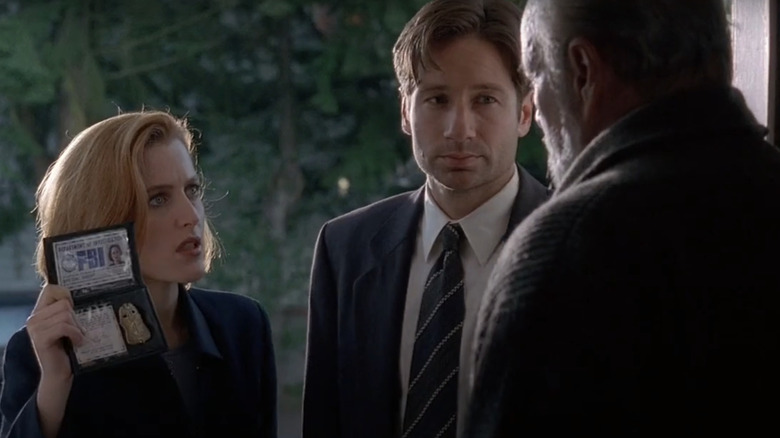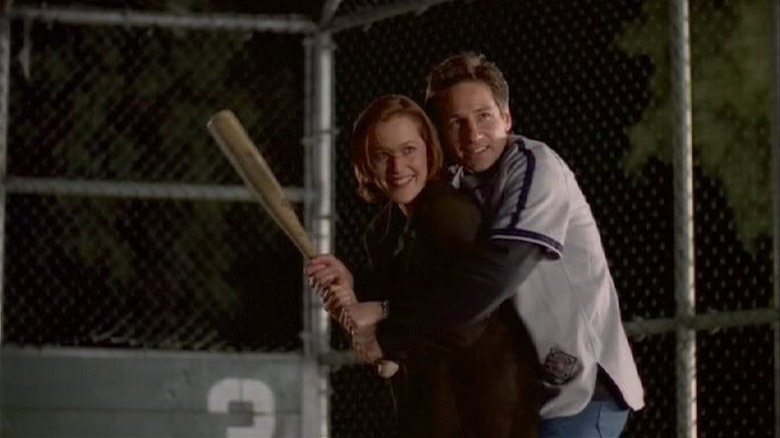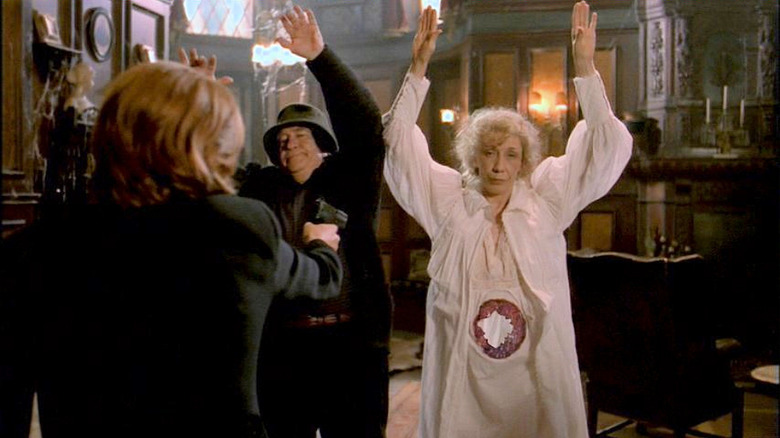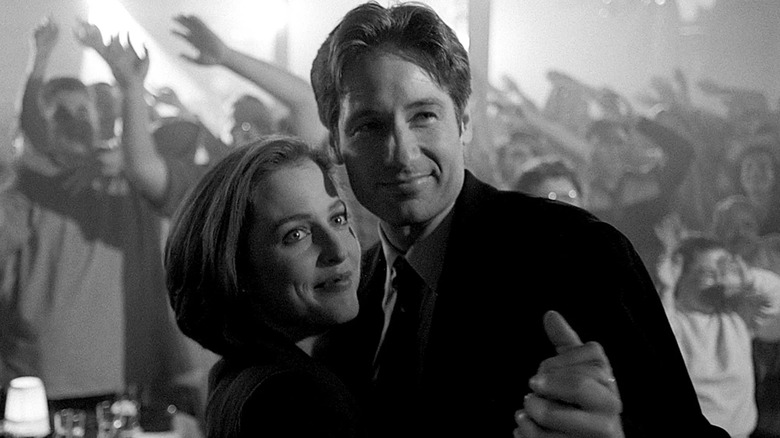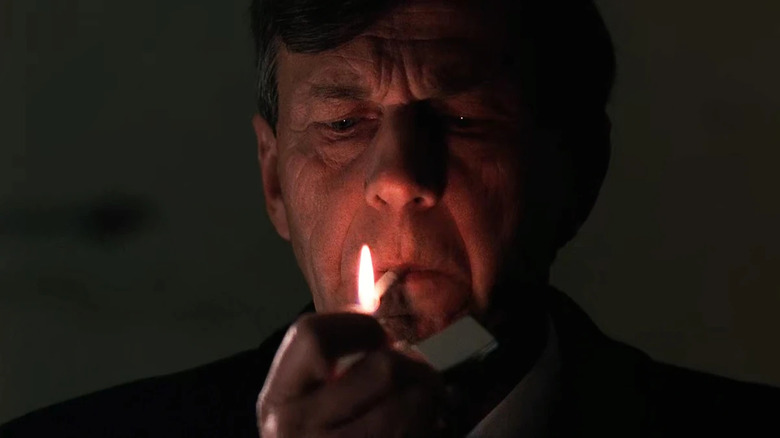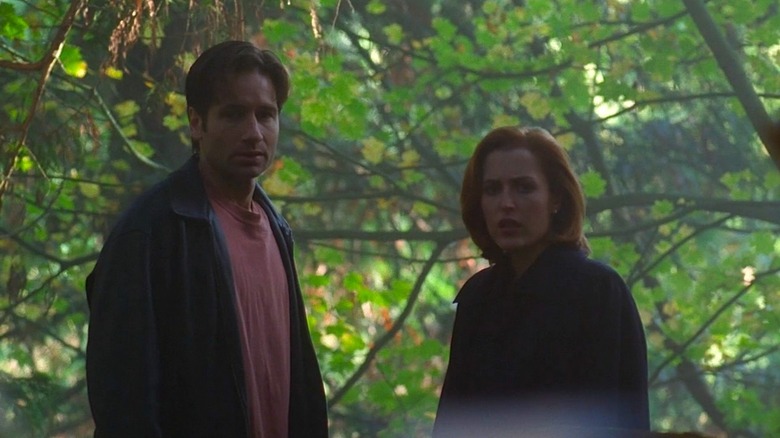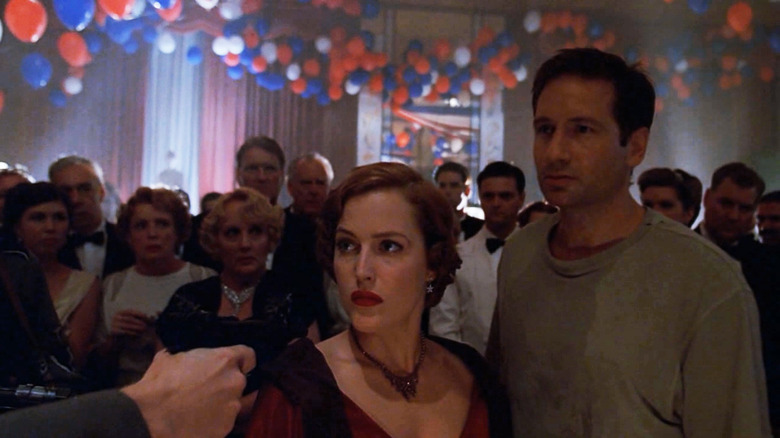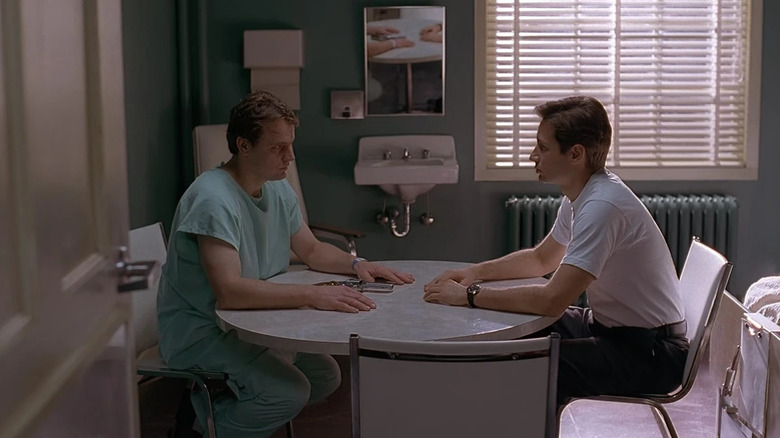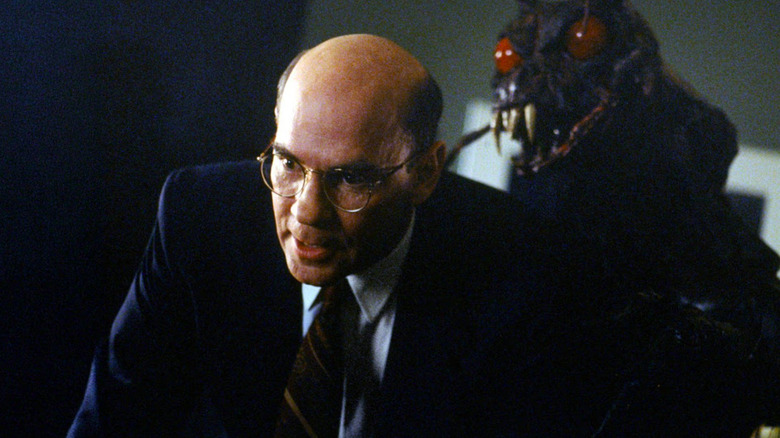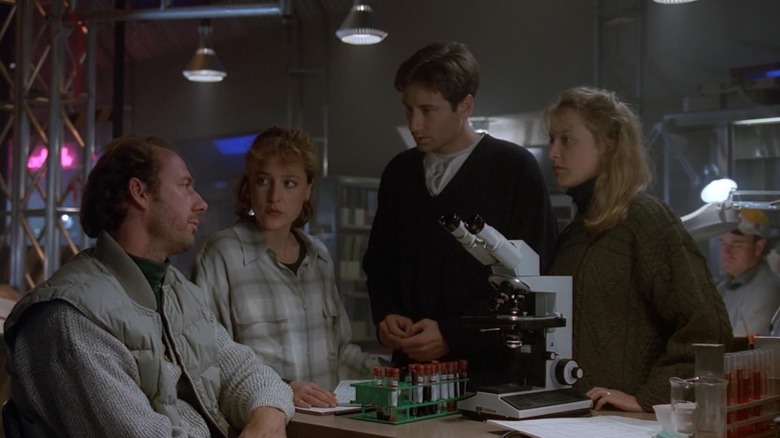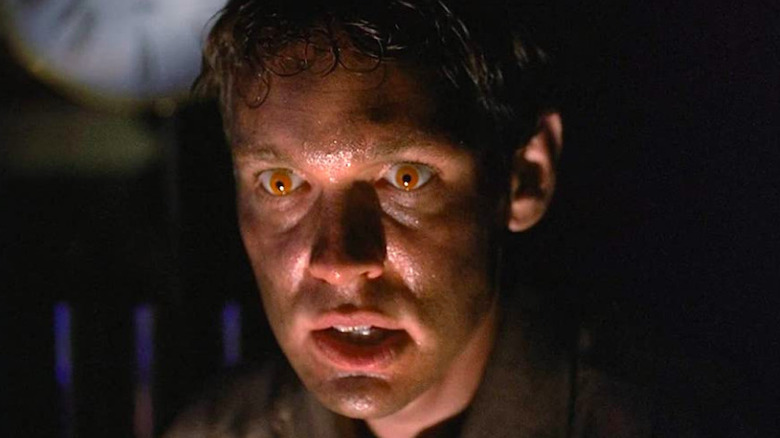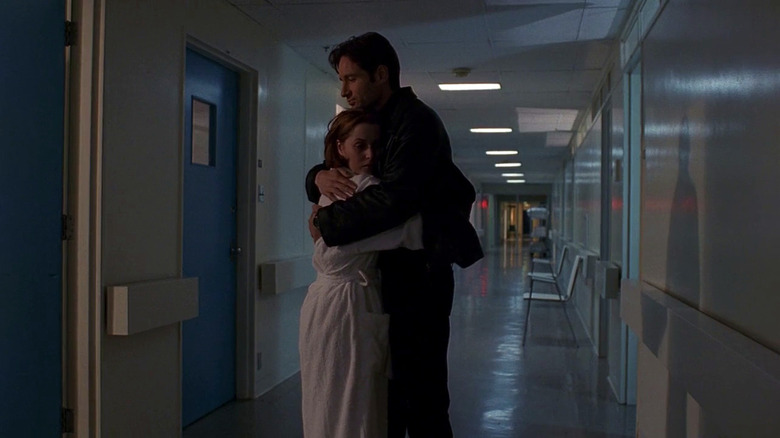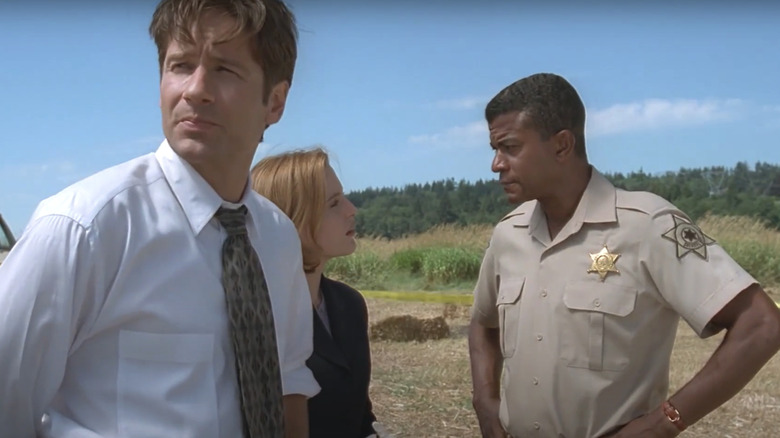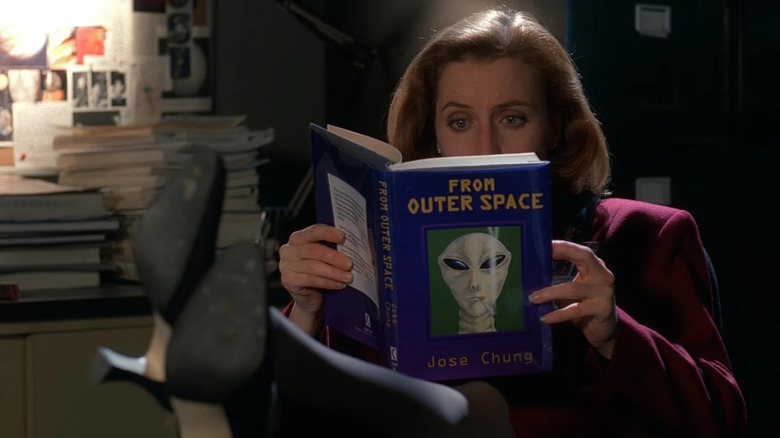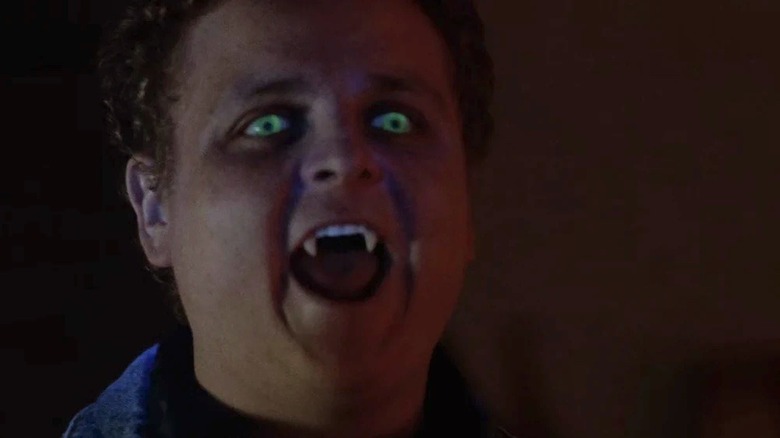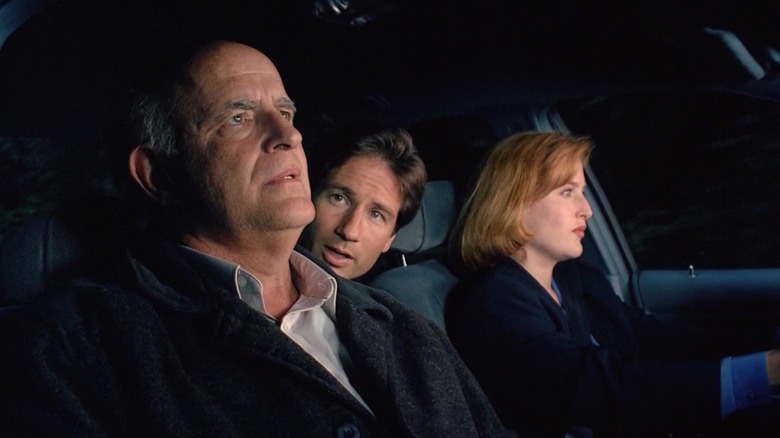The 15 Best Episodes Of The X-Files, Ranked
Fans of "The X-Files": We'd like to present the cream of the crop (circle).
Fox's alien-obsessed sci-fi series ran for nine seasons in the 1990s and early 2000s, then returned for two revival seasons from 2016 to 2018 (as well as for a couple of feature films). Throughout, the show's central FBI agents Fox Mulder (played by David Duchovny) and Dana Scully (Gillian Anderson) investigated all matter of the unknown, from little green men to global geopolitical conspiracies.
If you watched, you likely have thoughts about the show's greatest episodes. What a coincidence: We do, too! So below, we've come up with our 15 top installments. Scroll through to see which episodes made the cut, then hit the comments with your personal "X-Files" faves.
15. The Unnatural (Season 6, Episode 19)
The moments we get to see Mulder's interest outside of alien-hunting are always a treat, and "The Unnatural" hits that sweet spot between the personal and the extra-terrestrial. In a nod to Mulder's passion for baseball, this Season 6 episode takes us back to the 1940s. Written and directed by baseball fan David Duchovny, the episode tells the story of an alien who loves America's pastime. The alien, who goes by the name Josh Exley (played by Jesse L. Martin, who'd go on to star in series like "The Flash"), disobeyed his people by remaining on Earth to play the game.
Though this episode tangentially connects to the larger "X-Files" mythos via the inclusion of the Alien Bounty Hunter, it mostly functions as a sweet, self-contained story. Exley chooses to take the form of a Black man and play in the Negro league as a means to stay under the radar. The Alien Bounty Hunter, taking advantage of the era's racism, disguises himself as a Klu Klux Klan member. While the hour borders on cheesy at times, it's impossible to deny the delight of watching Mulder and Scully play baseball together at the end of the episode, giving 'shippers plenty to talk about.
14. How the Ghosts Stole Christmas (Season 6, Episode 6)
The first "The X-Files" Christmas episode, Season 5's "Christmas Carol," is a rather dour affair; the Season 6 episode "How the Ghosts Stole Christmas," on the other hand, is one of the show's best offerings. The episode includes an incredible pair of guest stars, in the form of Lily Tomlin and Ed Asner, who play lovers who carried out a suicide pact nearly a century before. Every Christmas Eve, they haunt their old house with the intention of convincing another couple to join them in the afterlife.
Though it's the night before Christmas, Mulder convinces Scully (with the help of a lost pair of car keys) to join him on a late-night haunted house stakeout. When the agents enter the house, Maurice (Asner) and Lyda (Tomlin) play mind games with the pair to try and convince them to kill each other. The ploy almost works, until Mulder realizes it's all an illusion. Though the tone of the episode is lighthearted, it also brings up some existential questions and proves once again how much Mulder and Scully love each other. "How the Ghosts Stole Christmas" ends on a sweet note, with Mulder and Scully exchanging gifts in the middle of the night.
13. The Post-Modern Prometheus (Season 5, Episode 5)
Though the style of "The Post-Modern Prometheus" might not be for everyone, you've got to give it credit for following through on such a zany premise. Written and directed by series creator Chris Carter, the black-and-white episode serves as an homage to Mary Shelley's "Frankenstein," with visual references to James Whale's 1931 adaptation of the novel.
We follow Mulder and Scully as they travel to a town where women report being impregnated by a monster. Mulder and Scully eventually meet the monster, The Great Mutato, a genetic experiment a lá the creature in "Frankenstein." Mutato is obsessed with Cher and loves watching talk-show host Jerry Springer (who appears as himself), leading to the episode's iconic finale. The dynamic duo takes Mutato to a Cher concert –- though the singer doesn't actually appear in the episode –- and the hour ends with Mulder and Scully dancing to Cher's version of "Walking In Memphis."
12. Musings of a Cigarette Smoking Man (Season 4, Episode 7)
In a show filled to the brim with mythology and conspiracies, the Cigarette Smoking Man, or CSM (played by William B. Davis), remains one of the most compelling "X-Files" mysteries. In Season 4's "Musings of a Cigarette Smoking Man," we learn more about his history ... or do we? In this episode, Frohike, one of the Lone Gunmen, discovers information about CSM's past. A magazine article claims that CSM was involved in countless era-defining historical events, such as the Bay of Pigs Invasion, the assassinations of JFK and MLK, the "Miracle on Ice," the Anita Hill hearings, and the Rodney King verdict. Oh, and he's got a mysterious connection to the Mulder family.
It's never confirmed whether all of this information is true or not, but the fact that CSM has a sniper rifle pointed at the group indicates that Frohike might be on to something. The episode pulls off a magic trick, offering us a fascinating story about CSM while still preserving his shadowy mystique. It's an essential piece of "X-Files" lore, and it's a thrill to see an entire episode centered on one of the most fascinating characters in the series.
11. Paper Hearts (Season 4, Episode 10)
The Season 4 episode "Paper Hearts," written by "Breaking Bad" creator Vince Gilligan, takes us on a journey deep into Mulder's psyche. Fox finds the remains of a young girl based on a dream he had and concludes that she was the victim of John Lee Roche, a serial killer whom Mulder profiled and captured years before. Scully discovers that Roche started killing earlier than previously thought. Roche manipulates Mulder into believing that Roche killed his sister Samantha, whom Mulder long believed was abducted by aliens: In fact, that's the whole reason Mulder joined the FBI and started the X-Files.
In this chilling episode, Mulder begins to question the beliefs he once held so strongly. Roche emerges as a formidable foe; Tom Noonan, who plays Roche and previously starred as a serial killer in Michael Mann's "Manhunter," injects the character with an extremely sinister energy. Though the episode delves into the mystery of Samantha's disappearance, we learn more about Mulder's psychological scars than we do about his sister.
10. Triangle (Season 6, Episode 3)
Technically, "Triangle" features Mulder and Scully's first on-screen kiss, but since they weren't the same Mulder and Scully we're used to seeing, most 'shippers don't count it as their first smooch. This Season 6 episode tackles a subject the show was bound to cover at some point: The Bermuda Triangle. Written and directed by Chris Carter, the episode reads like a mash-up of "The Wizard of Oz" and "Back to the Future," while Carter drew directorial inspiration from Alfred Hitchcock's "Rope," using long shots to make the episode feel as though it's unfolding in real time.
We follow Mulder's journey through time as he searches for the Bermuda Triangle. He finds it, and in the process becomes trapped on a ship called the Queen Anne, which disappeared in 1939. While on board, he's forced to contend with Nazis, as well as other passengers who look — but don't act — like people he knows. Hence, the alternate reality Mulder/Scully kiss. In the present day, Scully searches for the missing Mulder, but gets stonewalled by the FBI. The agents' concurrent journeys are great fun to watch, and the episode's tone –- mysterious, thrilling, whimsical, and certainly quite Hitchcockian -– makes it one of the series' best.
9. Pusher (Season 3, Episode 17)
"Pusher" represents "The X-Files" at the height of its power, as a gripping FBI procedural with eerie supernatural elements. The tense, stylishly shot episode centers on Robert Patrick Modell, a man who can convince people to kill themselves with his mind –- the result of a terminal brain tumor. Another hour written by Vince Gilligan, the episode presents us with a classic game of cat and mouse between a serial killer and the FBI agent on his trail, but with actual mind control instead of standard psychopathic manipulation.
The entire episode is riveting, but never more so than during a climactic scene where Mulder and Scully face down death. In a brilliant encapsulation of their relationship, Modell ropes the pair into a game of Russian roulette, forcing Mulder to put a gun to his head and then to aim it at Scully's. The message: The partners' deep feeling for each other keeps them going, but it's also their greatest liability.
8. Folie à Deux (Season 5, Episode 19)
Though the term is now most associated with the divisive "Joker" sequel, "X-Files" fans know "Folie à Deux" as the episode with the giant bug. This episode takes Mulder's constant struggle -– that everyone thinks he's crazy due to his peculiar beliefs -– to a heightened, terrifying place. Mulder investigates the case of a man who believes his boss is an insect monster. Though Mulder initially believes it's a hoax, he later sees the man's boss as a giant insect himself.
Mulder's insistence that the man is an evil bug lands him in a mental hospital, with Scully as his only ally. Though trying to exonerate Mulder, Scully believes he's experiencing folie à deux, aka a "madness shared by two." Despite Scully's skepticism, she comes through for Mulder like she always does. The episode concludes with one of the greatest Mulder/Scully moments, when Mulder begs Scully to believe him, calling her his "one in five billion." It's a moving delineation of their dynamic, in which Scully, despite her best efforts to avoid doing so, joins Mulder in his madness.
7. Ice (Season 1, Episode 8)
Most horror fans will be familiar with the plot of "Ice," a hugely satisfying Season 1 episode. The hour follows Mulder and Scully as they travel to a remote outpost in Alaska, where a group of geophysicists died in an apparent murder-suicide. The agents discover that an ancient alien may be to blame for this madness, and Mulder, Scully, and the scientists that accompanied them (played by Felicity Huffman, Xander Berkeley, and Steve Hytner) begin to suspect each other of being under the alien's influence.
Yes, this episode bears a remarkable resemblance to John Carpenter's creature classic "The Thing," and that connection was no accident. In fact, production designer Graeme Murray worked with Carpenter on "The Thing." Cinematic homages aside, "Ice" succeeds because its premise is endlessly entertaining, and seeing what Mulder and Scully will do under extreme circumstances never fails to delight.
6. Squeeze (Season 1, Episode 3)
Though he appeared very early on, in just the third episode of the series, Eugene Tooms remains one of the scariest monsters in the history of The X-Files. The first of the show's beloved Monster of the Week episodes, "Squeeze" begins with a man in Baltimore who has been killed and had his liver removed. This killing appears oddly similar to murders committed 30 and 60 years ago, and when Mulder and Scully encounter the culprit, they learn why. Tooms is a human-esque monster who can transform his body and squeeze through small spaces. Every 30 years, he comes out of hibernation and consumes enough livers to last him the next three decades.
While Tooms is an admittedly silly monster, he's still genuinely scary, what with his glowing orange eyes and slithery body. Doug Hutchison, who plays Tooms in "Squeeze" and in a later episode in Season 1, deserves much of the credit here, as he gives an enthusiastically creepy performance. Also: Mulder and Scully's relationship is still in its nascent stage at this point, but their classic dynamic has already emerged, giving us a delicious taste of what's to come.
5. Memento Mori (Season 4, Episode 14)
"The X-Files" operates on two emotional levels: repression or dramatic eruption. "Memento Mori" exists on the latter side, forcing the characters to confront their feelings for each other and the world around them. In this episode, Scully has just received a seemingly fatal cancer diagnosis, but insists on going to work. Though she's lost any hope of survival, Mulder and Skinner refuse to accept her fate and embark on a desperate mission to save her life.
"Memento Mori" ties in to the larger mythology of the series, as Scully's illness appears to be connected to her abduction, and the Cigarette Smoking Man reveals his involvement in the plot. But, despite its importance to the overall series lore, the episode proves its greatness through its emotional depth (though its shocking twists don't disappoint). We're reminded that Mulder and Scully would go to the ends of the Earth to save each other, and how much Skinner cares for the pair, as well. The episode features emotionally raw performances from the entire cast, though it's Anderson who rightly won an Emmy for her work here.
4. Home (Season 4, Episode 2)
"Home" has become a TV classic thanks to its famously controversial history. The episode became the first network TV show to earn a TV-MA warning, and Fox banned it from re-airing for several years after it premiered. "Home" follows Mulder and Scully as they travel to Pennsylvania after a deformed baby is found dead on a rural farm. (The disturbing infant burial is the episode's opening shot.) They learn that the child comes from an inbred family known as the Peacocks, who burned the infant alive.
Often included on lists of the scariest TV episodes of all time, including ours, "Home" hasn't lost its fear factor in the nearly 30 years since it aired. The imagery is truly frightening, as are the inbred brothers who go around town clubbing people to death. The episode's underlying message is well-said, as it concludes that it's not modernization and progress that corrupts small-town life, but rather the insidious underbelly of communities stuck in the past.
3. Jose Chung's From Outer Space (Season 3, Episode 20)
Darin Morgan only wrote two episodes of "The X-Files" prior to the reboot, and we've given both of them top spots on this list. In the comedic but heartfelt episode "Jose Chung's 'From Outer Space,'" Morgan delivers a meta sendup of the alien genre. We meet novelist Jose Chung, who's working on a book about a supposed alien abduction. He interviews Scully, Mulder, the two teenagers who claim to have been taken, and several other potential witnesses. Everyone recounts a different version of events, calling into question the issue of unreliable narrators.
In addition to 1960s and '70s TV legend Charles Nelson Reilly, who plays the titular character, "Jose Chung's From Outer Space" also features "Jeopardy!" host Alex Trebek and wrestler/politician Jesse Ventura as Men in Black. Though it's a bizarre episode that makes everyone look silly, it also contains a kernel of thoughtful critique. By the end of the episode, the characters feel more isolated than they did before, as they attempt to grapple with the concept of subjective truth and the solitary nature of their own perspectives.
2. Bad Blood (Season 5, Episode 12)
Are vampires real? "Bad Blood" takes a stab at answering that question, with darkly comic results. The episode begins with Mulder killing a supposed creature of the night with a stake, only to discover it's a teenager wearing fake fangs. The rest of the episode tracks the fallout, as Mulder and Scully attempt to get their stories straight to appease their superiors. The seemingly open-and-shut case becomes more complicated when the teenager comes back to life during his autopsy.
Much of the episode's humor comes from how different Scully and Mulder's versions of events are. Both retellings position the agents as the heroes of the story, highlighting the subjectivity of truth, as in "Jose Chung's 'From Outer Space.'" While the death of a civilian is an undeniably dark subject matter, the episode stays mostly in lighthearted territory, proving just how good the show –- and writer Vince Gilligan –- is at balancing horror and humor.
1. Clyde Bruckman's Final Repose (Season 3, Episode 4)
"Clyde Bruckman's Finale Repose" is widely considered one of the best, if not the best, "X-Files" episodes of all time, and we're not going to argue with that consensus. Penned by the brilliant Darin Morgan, the episode serves as a moving exemplar of the show's best qualities. Peter Boyle ("Everybody Loves Raymond") plays Clyde Bruckman, a psychic with the ability to foresee people's deaths. Mulder and Scully team up with Bruckman while trying to solve a case involving a serial killer targeting psychics.
The X-Files frequently played with genre throughout its run, jumping from thriller to comedy to melodrama. "Clyde Bruckman's Final Repose" seamlessly combines these diverse influences, resulting in a deeply existential episode with moments of both humor and terror. Through their time with Bruckman, our agents discover that finding the truth is not always worth the consequences, that obsession kills, and that human connection is the only way to stave off despair. It's perhaps the most important lesson they learn in the entire series.
The episode was as celebrated then as it is now, garnering the series its first two major Emmy awards, for Morgan's writing and Boyle's acting, beating out beloved shows like "ER" and "NYPD Blue." It's the episode that put The X-Files on the map, and it's contains the most poignant moments in the entire series.
